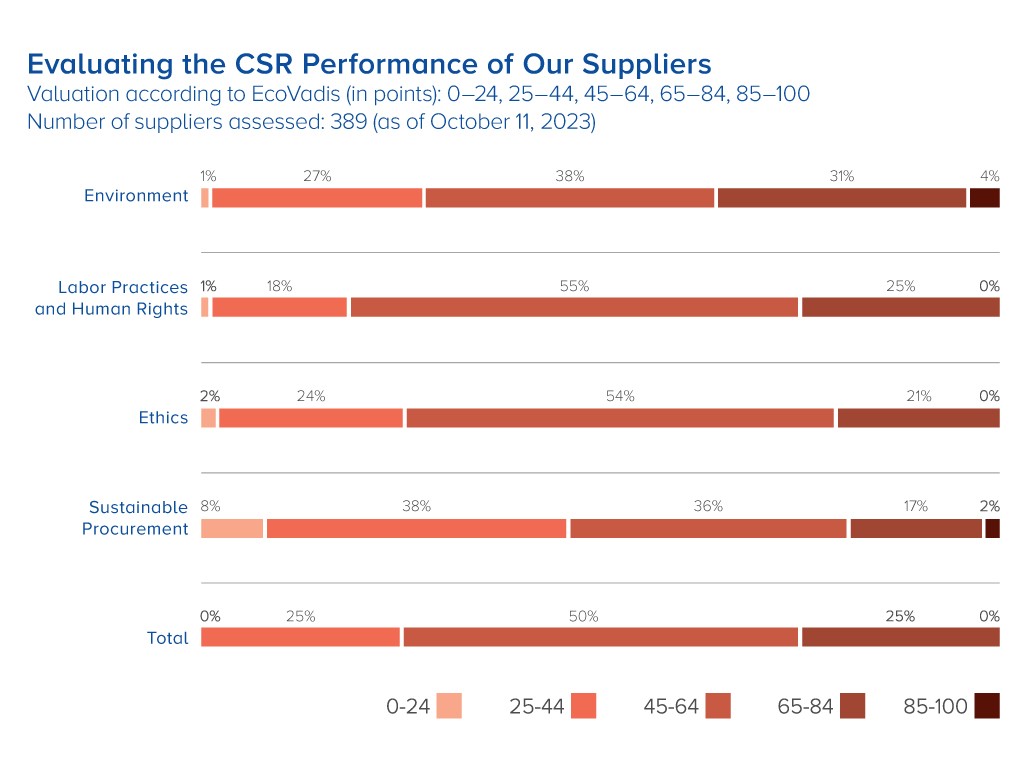Significance
Importance To Berry Global and our Stakeholders
Vigorous human rights standards and due diligence within our operations and throughout our supply chain are crucial to protect the rights and dignity of our employees, prevent forced and child labor, and uphold fair working conditions. It is important that our suppliers follow the same ethical standards and sustainable practices to mitigate risks related to environmental degradation, human rights violations, and unethical practices in the supply chain. Responsible supply chains safeguard our reputation, eliminate supply disruptions and potential legal issues, and align with consumers’ expectations for sustainable and responsible sourcing.
In addition, positive labor conditions help us to maintain a harmonious and productive workforce, prevent labor disputes and strikes that can disrupt operations, and foster innovation and overall business continuity.
Our Customers: Just as we hold our suppliers to the same ethical standards as we hold ourselves, so do our customers. We are a critical part of our customers’ supply chain, and any ethics or human rights violations would reflect poorly upon them. This is becoming even more important with recent regulation, including the German Supply Chain Due Diligence Act and EU Corporate Sustainability Due Diligence Directive.
Our Investors: Strong labor conditions and robust, responsible sourcing mechanisms allow us to be more resilient and help mitigate disruptions and legal issues that could impact long-term value and risk exposure.
Our Approach
At Berry, we are committed to upholding human rights and the dignity of workers in our value chain. Our Board of Directors oversees our strategy and management of these critical issues. Our approach to human rights and fair labor standards is informed by the UN’s Universal Declaration of Human Rights, the International Labor Organization’s (ILO) Fundamental Principles and Rights at Work, and the 10 principles of the UN Global Compact. We use EcoVadis to understand risks around human rights, such as assessing human resources processes and human rights management. We also partner with the global technology company SEDEX at many of our facilities to support our customers’ goals for ensuring good working conditions, business practices, and responsible sourcing along their global supply chains. Berry outlines responsible sourcing expectations for our suppliers that are consistent with the UN Guiding Principles on Business and Human Rights and informed by landmark documents—and we conduct self-audits to help ensure we are upholding fair labor practices.
We understand the complexities around human rights, as we, along with our suppliers, operate in global regions where there are increased risks of human rights violations. This underlines why our Global Human Rights Policy and UK Modern Slavery Act Statement are essential to confirm our position and set clear expectations with our business partners. We have processes in place to assess and mitigate human rights risks. As we note in our Modern Slavery Act Statement, we regularly assess these risks, including freedom from forced labor, respecting the rights of children and indigenous peoples, fair compensation, providing a safe work environment, following local laws and regulations, and respecting freedom of association.
Highlights and Target Progress
| Priority | 2024 Update |
| Respect human rights in our policies and supply chains |
As part of our continued goal to mitigate human rights risk in our supply chains, in 2024 we increased the number of suppliers we evaluted through the EcoVadis platform to 724. |
Key Metrics
The below metrics are based on Berry's fiscal years unless otherwise noted.
| Human Rights and Labor Conditions | ||||||
| 2022 | 2023 | |||||
| Collective Bargaining | Total | |||||
| Collective Bargaining Rate | 20% | 23% | ||||
| 2022 | ||||||
| Human Rights Training | Employees Completed | Completion % | ||||
| COMPLIANCE SHORT: Protecting Human Rights | 1084 | 98.5 | ||||
| 2024 | ||||||
| Minimum Wage Disclosure | Dollars ($) | |||||
| Minimum Hourly Wage for U.S. Workforce | 11.00 | |||||
| Building Responsible Supply Chains | ||||||
| 2024 | ||||||
| Risk Mitigation Process | Key Performance Related Metrics from EcoVadis Evaluation | |||||
| Total Suppliers evaluated through EcoVadis | 724 |
|||||
| Average score of evaluated Suppliers | 57 (9.6 above average assessment score in EcoVadis) | |||||
| Number of evaluated Suppliers who have completed corrective action | 54 |
|||||
| Number of Evaluated Suppliers who have Completed Corrective Actions in EcoVadis platform | 265 | |||||
| Percentage of evaluated Suppliers with at least 1 Operational Site ISO 14001:2015 Certified | 46% | |||||
| Score of Evaluated Suppliers by EcoVadis Category | ||||||
| 0-24 | 25-44 | 45-64 | 85-100 | |||
| Environment | 1% | 20% | 40% | 5% | ||
| Labor Practices and human Rights | <0.5% | 13% | 55% | <0.5% | ||
| Ethics | 1% | 27% | 47% | 1% | ||
| Sustainable Procurement | 5% | 41% | 35% | 1% | ||
| Total | <0.5% | 18% | 52% | 1% | ||
¹Data taken from the EcoVadis platform and correct as of December 1, 2024.
Key Strategies
Human Rights Due Diligence
We use EcoVadis to understand both inherent and gross risks around human rights, such as assessing human resources processes (e.g., health and safety, working conditions, and career management) and human rights management (e.g., discrimination, harassment, and child labor). EcoVadis also offers real-time monitoring of media and regulatory violations, including human rights.
Conducting human rights due diligence not only pertains to our supply chain, but also our own operations, which is why our Human Resources team is included in our risk assessment. As noted in our Modern Slavery Statement, we train our team members to identify potential human rights violations and what to do if they encounter such a situation. This past year, we trained all key stakeholders on human rights, which included a section that attested to our Global Human Rights Policy.
There have been no known violations of human rights within our operations or supply chain, but we expect our team members to remain vigilant. We have a mechanism to “speak up” if anyone has a human rights concern and have implemented a Non-Retaliation Policy that protects team members and external stakeholders (e.g., suppliers, social auditors, and community members) from retaliation for reporting a concern.
Labor Conditions
We believe that our industry-leading safety record is a result of treating our team members with dignity and respect. We conduct self-audits to ensure that we are upholding fair labor practices. In addition, around 20% of our employees are covered by collective bargaining agreements. We provide notice to employees in compliance with the local law regarding minimum notice periods. Notice periods may vary depending on length of tenure, level of employment, and collective bargaining agreement.
Responsible Supply Chains
We are committed to conducting business in a sustainable and socially responsible manner. We expect our suppliers to hold themselves to the same standard as well. With operations around the world, we seek suppliers that can support our global footprint and local expertise. Even during significant supply chain challenges, we continue to identify, support, and prioritize suppliers who operate and adhere to the same high standards as we do.
The responsible sourcing expectations that we outline for our suppliers are consistent with the UN Guiding Principles on Business and Human Rights and are informed by landmark documents such as the United Nations Declaration of Human Rights (UDHR) and the International Labor Organization (ILO) Declaration on Fundamental Principles and Rights at Work.
We ask that our direct and indirect suppliers and approved sub-contractors share our commitment to conducting business in a responsible manner. We expect our suppliers to be familiar with our process for responsible sourcing and to operate in compliance with our responsible sourcing expectations.
Responsible Sourcing Expectations
We engage with our supply chain on ESG issues to ensure they meet our expectations to conduct business in a socially responsible manner and continuously drive sustainable business practice improvements. We expect our suppliers to engage with their supply chain in a similar manner to further ESG alignment along the value chain. Expectations of adherence to these ESG issues are set through our Supplier Code of Conduct.
Environmental Expectations
In addition to complying with all pertinent environmental laws and regulations and maintaining applicable environmental permits, our suppliers should work to reduce the environmental impact of their operations. They should have all relevant processes in place regarding environmental spills and Emergency Prevention and Response. In addition, we recommend our suppliers have a formalized environmental policy, make efforts to manage and minimize any negative effects on biodiversity, and, where applicable, commit to Operation Clean Sweep® to prevent resin loss.
Social Expectations
Our suppliers must comply with all applicable labor and employment rights. This includes but is not limited to, ensuring that there is no child labor, involuntary labor, human trafficking, or any form of modern slavery in their operations or supply chain. Furthermore, they must ensure that wages and benefits, hours of labor, collective bargaining, and freedom of association strictly follow all local laws. Just as we prohibit any form of discriminatory practices, we expect our suppliers to have policies around non-discrimination and anti-harassment. In addition, we expect our suppliers to operate their business in an ethical manner, not only providing a workplace free from harassment but striving to have an inclusive environment and ensure their employees and other stakeholders are always treated with dignity and respect. Finally, we encourage our suppliers to implement a supplier diversity program and measure its effectiveness because diversity, equity, and inclusion are critical for succeeding in today’s world.
Governance Expectations
We expect all our suppliers to maintain awareness of and comply with all applicable international laws and regulations. Suppliers must have adequate procedures in place concerning fair competition, anti-bribery/anti-corruption, conflicts of interest, gifts, meals, travel and entertainment, trade compliance, product quality, data privacy & protection, and conflict minerals. Our suppliers should offer a means by which their employees and external stakeholders can raise concerns and have processes in place to ensure that those who “speak up” in good faith are protected from retaliation.
Supplier Code of Conduct
The Berry Global Supplier Code of Conduct outlines our mandatory requirements for our suppliers in relation to labor and employment rights, environmental health and safety, ethics and social responsibility, and global trade practices. The Supplier Code of Conduct ensures that all our suppliers have clarity around our expectations and conduct business in line with our principles and values.
We expect all suppliers to return a signed copy of the Supplier Code of Conduct to confirm their commitment. Additionally, we expect our suppliers to establish a management system that supports the content of the code and monitors/records regulatory compliance. If necessary, we may conduct desk or site audits to ensure compliance to the Code of Conduct.
If a supplier fails to meet the standards set forth in the Code, we will inform the supplier of the area(s) that require improvement and request a corrective action plan. If the plan is approved, the supplier will be given a set period to resolve the issues. If potential issues are not resolved, we may terminate the business relationship.
Risk Assessment and Due Diligence
In addition to our Supplier Code of Conduct, we leverage a two-step program to further identify and mitigate ESG risks in our supply chain. Where the Supplier Code of Conduct ensures commitment to our mandatory requirements, our supplier risk assessment platform enables us to recognize our highest-risk suppliers and encourage continuous improvement to their ESG program.
Risk Identification and Monitoring
The utilization of a risk-modelling platform enables us to map our entire supply base for ethical, social, and environmental risks, which provides us with robust risk visibility throughout our supply chain. New suppliers can be added to the system and immediately assessed, meanwhile, existing suppliers are monitored in real-time, so any changes to their risk profile can be identified immediately. Through this process, we can gather an inherent risk score for each supplier, based on key categories such as industry, spend, and country of operation. We aim to evaluate 100 percent of our suppliers and identify their inherent risk score as low, medium, or high risk.
Risk Mitigation
To mitigate identified risks, we utilize an evidence-based comprehensive assessment, EcoVadis, through which a supplier is scored on four themes: Environment, Labor and Human Rights, Ethics, and Sustainable Procurement. Companies with robust, responsible, and transparent sustainability practices receive higher ratings than those with limited ESG commitments. The sophisticated EcoVadis framework helps guarantee an organization cannot claim processes and internal controls are in place without providing verifiable evidence. Currently, 724 of our suppliers have been assessed through the platform, and scored an average score of 57/100. This is significantly higher than the average of all companies assessed by Ecovadis, which is 47.4.
We aim to have all identified medium-to-high-risk and critical Tier 1 suppliers take the assessment. However, we encourage all suppliers to complete the assessment, as it allows us to analyze the performance of our overall supply chain and individual suppliers based on their commitment to the four previously stated ESG themes and to track and monitor progress towards their KPIs.
If, after completing the assessment, a supplier fails to meet our expectations across any of the themes, they may be asked to implement corrective actions or risk losing the business relationship. Currently, no minimum score has been mandated to our suppliers.
Conflict Minerals

Reporting Concerns
If suppliers are unclear about any expectation, they can review our Supplier Code of Conduct or reach out to their main point of contact at Berry. Suppliers can also use our confidential reporting Ethics Helpline to voice concerns without retaliation.
SEDEX
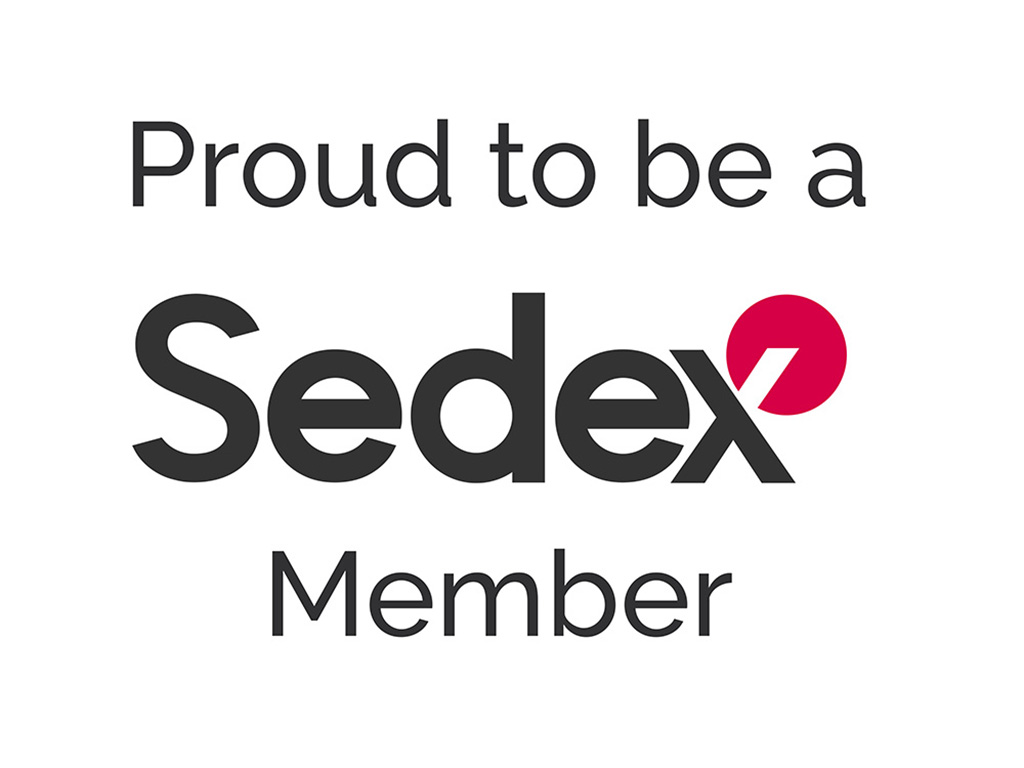
Supplier Diversity
We understand that our long-term success will be shaped by how well diversity, equity, and inclusion are embedded into our organizational culture and business practices, and this includes diversity in our supply chain. We are committed to supporting economic development efforts with diverse suppliers to the extent that jobs may be provided, entrepreneurship may be advanced, and useful goods and services may be produced at competitive prices.
Disclosures
Contribution to the Sustainable Development Goals (SDGs)
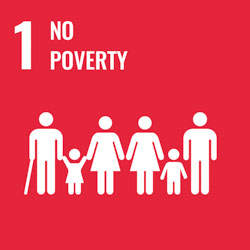
We are committed to ensuring that our employees are fairly compensated, and through our Supplier Code of Conduct our suppliers are held accountable to the same standards that we hold ourselves. By implementing the robust labor conditions outlined in our Global Human Rights Policy, we help contribute to poverty reduction along the supply chain.

Treating all our employees with dignity and respect, regardless of gender, we reduce workplace discrimination and help ensure equal opportunities for all.
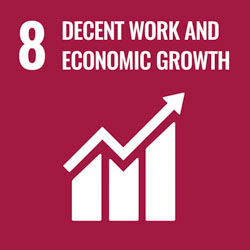
By upholding fair labor practices, promoting a culture of safe working conditions, and eliminating human rights violations in our supply chain, we contribute to the well-being of our employees and support economic growth in our communities.
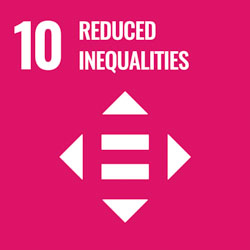
Through key policies outlining our human rights and anti-discrimination strategies, we help ensure fair labor practices and human rights are upheld both in the workplace and by suppliers, reducing inequalities within our company and our broader supply chain.
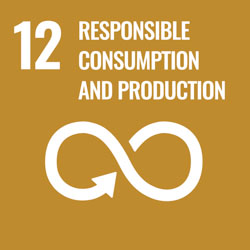
Responsible supply chain management ensures that raw materials used in our products are sustainably and ethically sourced. By collaborating with suppliers who adhere to robust labor standards, we are helping limit negative impacts across our supply chain.

Fair labor practices, including providing safe working conditions and respecting workers' rights, contribute to creating just & inclusive societies. By engaging with suppliers who also adhere to ethical & human rights standards, we extend our commitment to justice and accountability throughout the supply chain.

Collaboration is key when driving ethical compliance across the value chain. By partnering with suppliers and industry peers, we are working to set robust supply chain practices and improve human rights and labor conditions across the industry.
GRI and SASB Alignment
GRI 2-24 Embedding Policy CommitmentsGRI 408(3-3) Child Labor
GRI 408-1 Operations and Suppliers at Significant Risk for Incidents of Child Labor
GRI 409(3-3) Forced or Compulsory Labor
GRI 409-1 Operations and Suppliers at Significant Risk for Incidents of Forced or Compulsory Labor
GRI 411(3-3) Rights of Indigenous Peoples
GRI 411-1 Incidents of Violations Involving Rights of Indigenous Peoples
GRI 412(3-3) Human Rights Assessment
GRI 412-1 Operations That Have Been Subject to Human Rights Reviews or Impact Assessments
GRI 412-2 Employee Training on Human Rights Policies or Procedures
GRI 412-3 Significant Investment Agreements or Contracts That Include Human Rights Clauses or That Underwent Human Rights Screening
GRI 414(3-3) Supplier Social Assessment
GRI 414-1 New Suppliers That Were Screened Using Social Criteria
GRI 414-2 Negative Social Impacts in the Supply Chain and Actions Taken
Last updated: March 17, 2025
